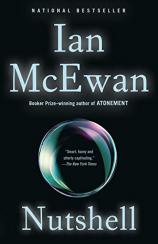Nutshell
Review
Nutshell
In the first 10 pages, you realize that the narrator of NUTSHELL, a soon-to-be baby in utero, has a better vocabulary than you do. Or perhaps you don’t need to look up “aporia,” “architrave” or “aubade.” (Yeah, me neither.) Not surprising from Ian McEwan, the much acclaimed British novelist. In any case, this lean, stylish novel will draw you in --- way in --- to the womb of a very pregnant 28-year-old beauty named Trudy. While her pedantic unborn child loves her, the conversations he overhears cause him not to like her very much.
He’s hardly a wanted child. Trudy is separated from the baby’s father, John, a dedicated poet who runs a small literary press. In fact, she has kicked him out of his own rundown but priceless London home, claiming she needs some space. She uses the “space” to conduct an affair with John’s younger brother, Claude, a whistling, boring boor. “Dull to the point of brilliance, vapid beyond invention, his banality as finely wrought as the arabesques of the Blue Mosque.” John expresses no concern for his child growing in Trudy’s womb, but he still visits her, rather pathetically, to read her poetry, to hear her excuses, to be shooed out before Claude returns. “Trudy continues to tolerate the occasional recitation. For her, a monologue is better than an exchange, preferable to another turn round the unweeded garden of their marriage.”
"In under 200 pages, McEwan has crafted a taut, literary thriller that can only add to his deservedly lofty reputation."
Trudy has a habit of falling asleep to podcasts, which has contributed to our hero’s encyclopedic knowledge of the world and its failings. He despairs of being born into “the exercise yard of dumb existence,” and yet he wants his chance in it, too. She also has a habit of drinking. “I like to share a glass with my mother… I know that alcohol will lower my intelligence. It lowers everybody’s intelligence. But oh, a joyous, blushful Pinot Noir, or a gooseberried Sauvignon, sets me turning and tumbling across my secret sea, reeling off the walls of my castle, the bouncy castle that is my home.” At first, she limits herself to two glasses at a time, but as their nefarious plot to be rid of John thickens, she and Claude are soon drunk more than they are sober.
John, who seemed like such a sensitive loser, comes by with a pretty young poet named Elodie. “By nocturnal association I dress her in tight-fitting black leather jacket and jeans, let her be young, pale, pretty, her own woman. My placenta, like branching radio antennae, finely attuned, is receiving signals that my mother instantly detests her.” Over wine (of course!), John makes a passionate speech about the love he and Trudy shared, but admits that it “died quickly, tragically, as love on a grand scale must.” He’s in love with Elodie. They’ll be moving back into his house, and he expects that Trudy will move out into Claude’s. This ignites Trudy’s hatred and jealousy, and throws new urgency into Claude and Trudy’s plans.
How can a novel this dark be so much fun? Surely the brilliance of the writing has a lot to do with it. We can’t help rooting for this little sot in his nutshell, speculating about his future life and the politics of the greater world, wondering whether he can or should affect the plans of his scheming mother and uncle. He grows bigger, his quarters more cramped. “I wear my mother like a tight fitting cap.” The stakes rise and biology has the trump card, but it would be churlish to reveal more of the plot. In under 200 pages, McEwan has crafted a taut, literary thriller that can only add to his deservedly lofty reputation.
Reviewed by Eileen Zimmerman Nicol on September 15, 2016
Nutshell
- Publication Date: May 30, 2017
- Genres: Fiction, Psychological Suspense, Psychological Thriller, Suspense, Thriller
- Paperback: 224 pages
- Publisher: Anchor
- ISBN-10: 0525431942
- ISBN-13: 9780525431947





